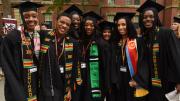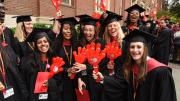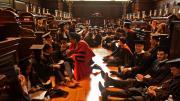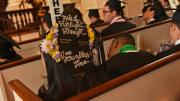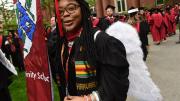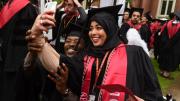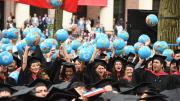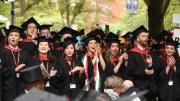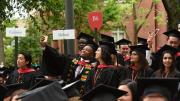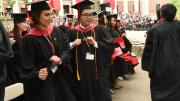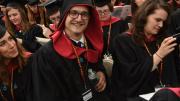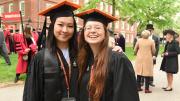For a newish president, Lawrence S. Bacow has had a lot of practice with the solemn ritual and spirited hoopla of graduations. He was on the receiving end as an undergraduate at MIT (1972), and then slightly upriver at Harvard (M.P.P.-J.D. ’76, Ph.D. ’78), before moving to the dark side (university administration). In that capacity, he conducted commencements at Tufts, where he presided from 2001 through 2011. As a Fellow of the Harvard Corporation from 2011 on, he has even enjoyed the view of Harvard Yard from the dignitaries’ platform alongside Memorial Church during the full-scale capital-C Crimson Commencement extravaganza. Two Mondays ago, on May 20, Yale—in keeping with a kindly Cambridge-New Haven-Princeton custom—let him enjoy another such occasion, free from any onerous obligations, by awarding him an honorary degree that hailed Bacow as a “vanguard of veritas” (but wishing, as the program note put it, “lives of adventure, joy, and fulfillment—on all days except the Saturday before Thanksgiving”).
Come this morning, Harvard’s twenty-ninth president got to draw on all those experiences as he occupied the central seat in the back row of the platform, the best in the house, for the 368th Commencement. In return, he had to wield his new authority to confer 6,665 degrees and certificates. As with the substantive aspects of the post-retirement job he assumed last July 1, Bacow seemed completely comfortable performing the ceremonial duties that come with the territory.
That calm radiating from the center was a blessing for the Commencement planners, who are by nature given to hysteria. Part of the Commencement director’s job, always, is fretting about the weather—one reason the incumbent, Stephan Magro, wears a shining-sun pin on his vest. So his normally upbeat mood darkened during the sodden spring (Boston had rain 21 days in April, a record, and May began 17-for-20), which was gray and cold even when it wasn’t actually wet: snow fell in western Massachusetts on May 14. The experts rigging the tent and other gear in Tercentenary Theatre literally did not break a sweat. Reason provided no comfort: projecting the bout of English weather forward to an imagined New England deluge or blizzard on May 30 was of course a statistical fallacy—but the planners refused to hear that their fears were fake news.
Then there was the all-important matter of seats: how to squeeze in a few hundred more degree candidates (driven by swelling extension-school enrollments; more engineers and applied scientists; the fruits of Harvard’s proliferating master’s degree programs; etc.)—most of them accompanied and cheered on, in the usual way, by a pair of parents. Plus the real newbies would have to be brought up to speed: Faculty of Arts and Sciences dean Claudine Gay and Graduate School of Education dean Bridget Terry Long, both responsible for getting large cohorts graduated for the first time; and, behind the scenes, James Engell, Gurney professor of English literature and professor of comparative literature, debuting in the role of faculty adviser to the three student speakers, who have pride of place during the Morning Exercises (see below). And one dared not even broach the subject of heightened security surrounding the appearance of German chancellor Angela Merkel, honorand- and Afternoon-Exercises-speaker-to-be (the latest in a series of leaders of the Federal Republic in this august role); it takes way more than a village to transport heads of state safely these days.
Fortunately, most of this agita was hidden from graduates’ and guests’ view. In the Harvard way, there was plenty to keep them occupied during the compressed schedule that unfolds in Commencement weeks beginning with a Memorial Day Monday, like this one. And of course, also in the Harvard way, most years, the weather became progressively less disagreeable as the Big Day neared: the damp weather pattern broke decisively May 20, with late-night thunder and a brief spike of heat and humidity, followed by temperate, spring-y days. So there, worrywarts.
The “Duties of Imagination”: Phi Beta Kappa and the Baccalaureate
Of course, after a splendid Memorial Day weekend, the drear weather reasserted itself Tuesday: gray, blustery, in the 50s, with morning showers just in time to moisten the Phi Beta Kappans’ mortarboards, and the promise of real rain to irrigate the gathering reunion-goers later in the day.
Commencement activities begin formally Tuesday morning, on a high plane, with the annual Phi Beta Kappa Literary Exercises in Sanders Theatre. Honor is paid to the diligent young scholars’ presumed artistic and academic tastes, and certainly their accomplishments, in the form of a poet and an orator. The pair this year represented home cooking: local dignitaries Dan Chiasson, Ph.D. ’01, a poet and essayist who professes at Wellesley College and is poetry critic for The New Yorker; and Eric Lander, professor of systems biology and president and founding director of the Broad Institute, the MIT-Harvard center for genomics research, headquartered in east Cambridge. (Connoisseurs of such matters may note that the 2018 poet was Kevin Young ’92, who is poetry editor of The New Yorker, and that that publication’s editor, proper, had another role to play on Thursday; see below.)
Chiasson delivered an original poem, “The Math Campers,” an apt title for the occasion (read the text here). Lander, reflecting on the unprecedented pace of progress in fields such as genomic and computer science, focused on the power, and obligations, of imagination:
…I now need to tell you about the fine print that you agreed to when you clicked “Accept” to Phi Beta Kappa—that is, the responsibilities that you took when you became a scholar.
Some people think of scholarship as dusty, fusty, monastic, esoteric. Allow me to dust off the word.
Scholarship is arguably the most transformative force in the world. Scholarship is the sum of two things: knowledge and imagination…knowledge and imagination.
It is broadly understood that “knowledge is power.” Knowledge is the foundation for all meaningful and lasting change.
It is somewhat less understood that imagination is how we direct the power to make change.
So, I want to talk to you about your “duties of imagination.” Whatever you do in your life, you have a duty to not just to do but to imagine. Whatever you work on, you have a responsibility to ask about your work two questions of imagination:
What could possibly go right? and
What could possibly go wrong?
Failures of execution tend to get a lot of attention. But, the greater risk often lies in failures of imagination. Why? Because humans tend to extrapolate linearly from current conditions. We tend to dramatically underestimate both the progress we can make—and the problems we can create.
The world moves farther and faster than most people think. My message to you is that, as scholars, you have a special ability and thus a special duty to imagine where things may go—so that we can seize opportunities and avoid pitfalls.
Lander’s full text as prepared for delivery is available here.
Although Bacow has emphasized many elements of continuity with his predecessor in Mass. Hall, he did not sustain Drew Faust’s Baccalaureate “parking-space theory of life” trope (don’t settle for the first space you find; push on to get closer to your goal). During his first Baccalaureate as president, on Tuesday afternoon, Bacow instead drew on a formative life experience to give the seniors permission, in effect, to make their own choices: “living your own life, not the life that others have planned for you.” After finishing his second year at Harvard Law School, he started a summer job at a law firm. He’d always thought he would become a lawyer, just like his father. “I thought it was what I wanted to do, and I knew it was what my father and other people expected me to do.
“One afternoon that summer,” he continued, “I was accounting for my billable hours, filling out a time sheet that broke every hour of my workday into six-minute increments. It is what lawyers do,” he explained. “From 9:00 to 9:06, finalized the deposition of Mrs. Jones; 9:06 to 9:12, called Dr. Smith to review his expert report; 9:12 to 9:18, continued to review expert report with Dr. Smith….You get the idea. Now before I continue, I want to say that the law can be deeply interesting and that that form of practice can be deeply satisfying for many people and I suspect will be deeply satisfying for some of you. I, however, had a totally different reaction to this experience. In fact, as my pencil hovered over [the space] between 9:24 and 9:30—that particular window in time, six minutes—my mind offered up a line from the T.S. Eliot poem, ‘The Love Song of J. Alfred Prufrock’: ‘I have measured out my life in coffee spoons.’ That line repeated itself to me over and over and over. Six minutes, six minutes, six minutes, and I realized that I was doing…what other people thought I should do and not, perhaps, what I thought I should do. When the summer ended, I began to let that idea of myself go and started figuring out how I really wanted to spend the rest of my life.
“Was it easy?” Bacow continued. “Absolutely not. My father was not happy that I had abandoned the law. In fact, true story, I had to become president of Tufts before my father finally admitted I had made the right decision.”
ROTC, Al Gore and Cecile Richards at Class Days, and More
For their sheer number of formal gatherings, Wednesdays present the most crowded agenda on Harvard’s Commencement calendar, as schools hold their individual class days. The events span the spectrum from the formal and serious, beginning with the morning ROTC commissioning ceremony and extending through the (typical) student silliness of at least one of the College class day undergraduate speakers.
Before choosing which to attend, visitors had to decide between parkas and ponchos: the morning dawned sodden and struggling toward 50 degrees, alternating between sprinkles and mist. The forecasters, who nailed Tuesday, suggested progress (of a sort); decreasing clouds, a high of 63—and no further chance of real showers…until early evening. As the day proceeded, it became clear the forecasters’ luck had run out: it remained murky and in the low 50s through the afternoon.
ROTC. The seven students present to take their oaths at the ROTC ceremony heard from both Bacow, who has repeatedly emphasized Harvard graduates’ role in performing public service (now, beginning before they matriculate), and General Mark A. Milley, the army chief of staff (and nominee to serve as chairman of the Joint Chiefs of Staff), a native of nearby Winchester, Massachusetts. Bacow said, “Those of us privileged to study at Harvard bear a special responsibility to use the gifts that we’ve been given to try to make the world a better place.” He called military service “the greatest demonstration of public service.”
General Milley said that the military personnel who would serve under the new ensigns and lieutenants would look to them for personal leadership, competence, and character. Those troops “don’t want to follow someone who’s immoral, who’s out there doing things like lying, cheating….They’re looking to you to have the spine to stand up and do that which is right, even when it’s going to cost you your career…who is not afraid to speak truth to power no matter what the cost will be to yourselves. Someone who is honest, who has standards,….” At the same time, enlisted personnel, he said, are also “looking to you to be humble.…” Referring to the ancient Greek concept of hubris, he said, “We see that in our daily lives all over the place: we see that in the military, we see it in politics, we see it in sports, in commercial life.…We see people who really think that they are above everything else.…” Military officers, he noted, “take an oath, and it’s not an oath to a king or queen or a dictator or a prince or any individual. We don’t do that. We take an oath to an idea…embedded in the Constitution of the United States of America.” It wasn’t perfect, he added, “and it’s evolved ever since,” but what it says is that “under that flag every one of us is born free and equal…and you will be judged by the contents of your character….”
The class days featured plenty of high-wattage people on the podiums, among them former Commencement speaker, New York City mayor, and businessman/philanthropist Michael R. Bloomberg, M.B.A. ’66, LL.D. ’14, at Harvard Business School; and the Posse Foundation’s founder and CEO, Deborah Bial, Ed.D. ’04 (profiled here), at the Ed School (appropriately, given Dean Long’s scholarly focus on college admission and attainment). In a politically divided country, and world, much of the talk was political, and serious.
Al Gore. Even as Chancellor Merkel was making ready to uphold the streak of German honorands and Commencement speakers on Thursday, the College’s featured guest was making something of a record of his own. Al Gore ’69, LL.D. ’94—former U.S. senator and vice president; co-winner of the 2007 Nobel Peace Prize for his climate-change leadership; and, but for the highly contentious Supreme Court decision on Florida’s hanging chads, perhaps former U.S. president—was effecting an unprecedented Tercentenary Theatre three-peat. He was Commencement speaker in 1994, keynote speaker for Harvard’s 2008 climate-change initiative, and now the main draw for the class of 2019.
The choice was locally resonant because his own senior spring, in 1969, saw the height of campus turmoil, as opposition to the Vietnam War, local echoes of America’s urban crisis, and demands for greater diversity, among other issues, boiled over into the occupation of University Hall, the “bust” as President Nathan Pusey summoned the state police, and the ensuing strike and rallies in Harvard Stadium. Those issues continue to resonate, among alumni and nationally, and are featured in an exhibition from University Archives, “Through Change and Through Storm: Harvard, 1969,” in Pusey’s eponymous library, on view through June 5. (Some people, of course, prefer to dwell on the epic 29-29 edition of The Game in November 1968, initially reported here and revisited, in its social and political context, here.)
In an urgent, fiery 30-minute address, Gore invoked Veritas not only as Harvard’s motto but also as “democracy's shield, and the right to pursue truth is the most fundamental right of them all. That right is now at risk. And as a result, freedom itself is at risk.” Tracing the fragile history of democracies, he said, “Supporters of authoritarianism define loyalty to America’s core principles as treason against its new would-be sovereign,” alluding to the Trump administration’s reference to the press as “enemies of the people.” A desire for more power “explains the appeal to would-be autocrats of multiple ‘bromances’ with extreme authoritarians—at least one of whom in our current time has been allowed to sink his teeth into America’s democratic electoral process and play with it like a chew toy.” When reason and logic are removed from public discourse, Gore warned, authoritarians can run rampant. When they erode the concept of truth, they can propagate any information they want to suit a given agenda. “Then all the questions before us are reduced to a simple question: who can exercise the most power in its rawest form?”
Turning to the issue that has animated his work for decades, he said, ““Now, because of the attacks on climate science, [authoritarianism] has become a threat to the survival of human civilization as we know it, and even potentially to the capacity of the human species to endure”—and elicited strong applause by advocating that the University divest its endowment holdings in fossil-fuel enterprises.
Other speakers of note. Elsewhere around campus and in the Longwood Medical Area,
- Cecile Richards, past president of Planned Parenthood of America, spoke at the public-health school convocation; at a time of proliferating state restrictions on access to abortion, she said policymakers were ignoring man-made crises of maternal health and gun-related violence, and urged the graduates-to-be to embrace a public, political role.
- Pro bono and public-interest litigator Roberta Kaplan ’88, who argued before the Supreme Court in U.S. v. Windsor, which effectively legalized same-sex marriage, told the Law School crowd that “The people who stand the most to lose from the battles raging around us today do not have the privilege to be sitting at this ceremony. They need your help now more than ever.”
- Nobel laureate Juan Manuel Santos, M.P.A. ’81, NF ’88, former president of Colombia, who negotiated his country’s agreement to end a long, brutal guerrilla war (now threatening to flare up again), told the Harvard Kennedy School students that peace had come about “Through good will, perseverance, courage, adequate planning—yes—but above all, by recognizing each other as human beings.”
- Vidal professor in the practice of creative writing Teju Cole, a novelist, essayist, and photography critic, was the guest at the Graduate School of Design event; he cautioned that “Design is not an intellectual exercise,” and reminded the future architects that they had to practice their profession intentionally for good, because “There are those who agree to build prisons. There are those who agree to build detention camps. Oppression has always had great use for architects and designers and urban planners. Redlining was a technical skill. And everything that betrays our collective humanity depends on people just like you, with skills just like yours.” He contrasted that with an “imperishably apt” quote from the author Toni Morrison, Litt.D. ’89, who once said, “I tell my students, ‘When you get these jobs that you have been so brilliantly trained for, just remember that your real job is that if you are free, you need to free somebody else.’”
Centennial Medalists. In an academic vein, the Graduate School of Arts and Sciences honored five of its own at its annual Centennial Medalist luncheon: Carroll Bogert ’83, A.M. ’86, former correspondent and now president of The Marshall Project, one of the new breed of journalism enterprises, this one focused on the U.S. criminal-justice system; Lael Brainard, Ph.D. ’89, a member of the Board of Governors of the Federal Reserve System; Roger W. Ferguson Jr. ’73, J.D. ’79, Ph.D. ’81, former vice chair of the Fed and president and CEO of TIAA; marine biologist Jane Lubchenco, Ph.D. ’75, former administrator of the National Oceanic and Atmospheric Administration and University Distinguished Professor at Oregon State; and favorite son Joseph S. Nye, Ph.D. ’64, international-relations and defense scholar, former government official, and dean emeritus of the Kennedy School.
The honorands. Typically, Wednesday comes to its exhausting formal end at the gala dinner for the honorands in Annenberg Hall—annually, the most glittering function the University throws for itself and its best friends. It is an apolitical occasion, and usually affords an excuse for extended schmoozing over cocktails, but the world intruded nonetheless. Given the presence of Chancellor Merkel, the high and mighty were warned in advance, “Due to increased security the dinner will begin at 7:00 p.m. sharp.” The honorands (see below) included a leader in bringing before the American public the history of African Americans; a journalist who has been a fierce critic of the current U.S. presidential administration; and a distinctively academic cohort, among them a feminist social anthropologist; a scholar of economic inequality; and a leading scholar of the art of China—with which this country finds itself very much in economic and political tension these days.
Merkel spoke early in the evening, rather than at its conclusion, noting that as a student scientist in East Germany, she had not been able to travel to the West. She was honored to be at Harvard, and in the company of so many professors who were fellow honorands. As a scientist, she appreciated that finding the truth depends on bringing as many perspectives to bear on a problem as possible—a deft segue to Harvard’s commitment to diversity in search of the truth, and in turn to her fellow honorand, Drew Gilpin Faust, as an exemplary leader of that search for truth through diversity. Full knowledge, Merkel concluded before her toast, was as unreachable as the horizon; but aiming for it was the point of the work. In that spirit, she saluted Veritas.
In Merkel’s honor, the musical interlude, performed by soprano Arianna Paz ’19, accompanied by pianist Benjamin P.Wenzelberg ’21, was an excerpt from Beethoven’s Fidelio. The delighted chancellor bounded up on the stage to congratulate the students—making Wednesday evening perhaps an even greater occasion for Paz than her graduation on Thursday morning. (One is reminded that heads of state do not enjoy total freedom of movement; at the end of the evening, Merkel was briskly escorted out the back of Annenberg by an all-business phalanx of security agents, fore and aft; and then whisked down Quincy Street, which was kept clear by state police troopers on motorcycles as her motorcade of a dozen SUVs sped off into the night.)
With that, sensible adults headed for bed, while the youngsters (for whom the events of the morrow were principally planned) went about doing whatever youngsters do on their last night as students together.
The Festival Rites: Graduation Day
The weather gods bowed, slightly, to Harvard’s will Thursday morning: 52 degrees, misty, and a uniform overcast gray sky at 6:00 a.m.—but with the promise of warming through the day to the upper 60s, and no rain until evening. So the Commencement planners, and the Happy Committee of alumni who pitch in, were mollified at least modestly. And there was an upside to the continuing late spring: an unaccustomed riot of campus color, with rhododendrons, azaleas, dawdling lilacs, alliums, nepata, and more still in bloom long past their customary off-sale date, and especially brilliant under the leaden firmament.
As usual, parents and staff did all the hard work, queueing up early for seats, manning the entry gates, and so on—while the students could sleep in, or party, late, knowing that their ways in and front-of-the-house chairs were reserved. Life gets harder from here!
Life for most of the students is, however, likely to be better than working in the gig economy: The Harvard Crimson’s annual senior survey, to which 717 students responded, elicited the familiar career paths of consulting, finance, and technology—accounting, respectively, for 18 percent, 16 percent, and 14 percent of those entering the workforce. Not for them being behind the wheel of one of the fleet of Uber and Lyft cars delivering parents and well-wishers to the long lines snaking around the yard by 6:15 a.m. Non-graduating students cannot be faulted for their enterprise: the Crimson’s crew was out in full force distributing the fat Commencement issue of the newspaper to all comers, ahead of the University’s official Gazette (which was distributed inside the gates).
Thirty minutes later, two bagpipers at the former Inn at Harvard (now swing dormitory space during the renewal of the undergraduate Houses) played their joyful, mournful tunes, echoing down Mass. Ave., as beloved Lowell House faculty deans Diana Eck and Dorothy Austin, in their academic gowns, entered, preparing to escort their young charges to graduation for the last time: they retire, after 20 years of service, at the end of the academic year—and Eck, who has anchored the Commencement broadcasts forever, it seems, may relinquish that role after today, too.
Tucked away in the parking and utility space behind Robinson Hall and Canaday, set up alongside their mobile command unit, the hard-working Harvard University police had a breakfast spread to fuel and caffeinate themselves for the hours of work ahead—and rightly so.
Security considerations aside (screens and ferns were placed before Merkel, who was seated next to Drew Faust with the honorands, and, across the aisle on the platform, before Marc Goodheart, secretary to the Corporation, and Provost Alan Garber), the morning’s business proceeded in the traditional way, with the prolonged academic procession into Tercentenary Theatre, the boisterous call to order by the preening sheriff of Middlesex Count, and the singing of “The Star-Spangled Banner” (read the program here). The chaplain of the day—Rabbi Wesley Gardenswartz, the Bacows’ rabbi, who also spoke at the presidential installation last October—spoke at length and passionately, urging all present above all else to “listen to one another.”
And then it was the student speakers’ moment of glory. Each was introduced by President Bacow. The two English addresses were affecting personal stories of inclusion—a journey from a public-housing project in Boston, and a flight from war-torn Algeria.
“Bibliotheca et Hortus” (“A Library and a Garden”): Latin Salutatory
Given the choice of learning Latin or Mandarin during high school, Kabir Gandhi ’19—the Latin Salutatorian at Harvard’s Commencement exercises today—chose Mandarin. But his school denied his selection. Having lived in Hong Kong with his family for a few years, he spoke the language too proficiently for the introductory classes, so Latin it was.
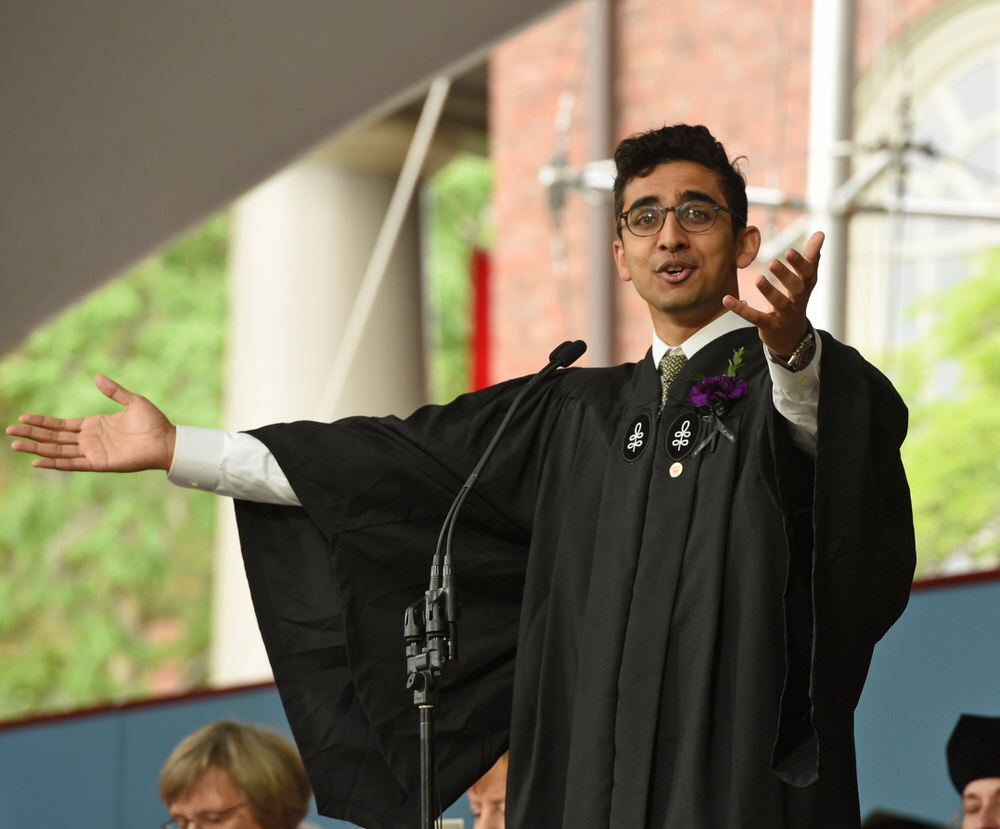
Kabir Gandhi
Photograph by Jim Harrison
Despite some initial apprehension, he fell in love with the language and its ability to “place [him] in the shoes of people who lived 2,000 years ago,” he said in a recent conversation. He remembers, early on, being amazed at how the Roman historian Tacitus wielded the malleable language in such a powerful, concise way. It was tough language for Gandhi to decode, but the payoff, he says, was worth it. In college, he decided, he wanted to be able to study both mathematics and the classics at a high level—and found his way to Cambridge. After living in Mumbai, Hong Kong, London, and New York with his family, he found a new home in Dunster House.
Though abstract math didn’t appeal much to him, he found he enjoyed Harvard’s applied math department, with its emphasis on mathematical programming and model-building. (For one assignment, he determined that Red Line trains should be scheduled six-and-a-half minutes apart—assuming a steady flow of trains and no change for rush hour.) Ultimately, he decided to concentrate in applied mathematics instead of classics (“I think I would consider myself better at solving math problems than writing essays,” he said), but he will graduate with a secondary concentration in the field—along with a Chinese language citation. He believes all three fields intertwine significantly, and said his work in applied math makes his approach to deciphering Latin a little different from his classmates’: “I think I’m a little more analytical and precise,” he said. Sometimes, he admitted, that means missing out on authors’ rhetorical flourishes that other students catch.
Although the Latin Salutatory is often the most humorous of the three Commencement student orations, Gandhi aimed more toward reflection than comedy. “And I think that has more to do with my style of writing than the times,” he said, chuckling. His speech hinges on a passage from Cicero: “If you have a garden along with a library, you have everything you need.” (“Si hortum in bibliotheca habes, deerit nihil.”) In Gandhi’s metaphor, Harvard’s buildings are the library and its green spaces the gardens. And while he finds truth in Cicero’s words, he uses his speech to take slight issue with them:
As I reflect on Harvard’s gardens and its libraries, it seems to me that if you have a garden along with a library you do not have everything you need. You must fill the library with inquisitive minds, always in search of truth. You must fill the garden with joy, laughter, and friendship. Harvard has been our library and our garden for these years, our beautiful retreat for learning from the past, for discussing present issues, and for imagining the future.
Historically, Gandhi said, Latin orators stood fairly still, gesturing on limited occasions with precise, firm movements to emphasize specific points. He said his performance was a balancing act between modern and ancient traditions. Structural differences between English and Latin mean that his side-by-side versions don’t line up word for word, and he doesn’t want to be understood only by those fluent in Latin. If a motion can cue the audience to where he is in his text, it’s worth a break from tradition.
Gandhi will spend next year as a Schwarzman Scholar, studying for a master’s at Tsinghua University, in Beijing, where he hopes to learn more about how investing can spur social and environmental progress in China. Though it’s unlikely he’ll study Latin at a higher level, he says he will “definitely” continue to read the language. Perhaps there he’ll get to deliver another oration—but this time, in Mandarin.
Read his text here.
“Just off the Orange Line”: Senior English Address
If you take the Red Line to Park Street, switch onto the Orange Line towards Forest Hills past the hustling vendors and the smell of fresh roasted peanuts toasting, and get off at the very last stop, you’ll end up there. No, not Harvard’s Arnold Arboretum, but instead the South Street Housing Development. Like Harvard, it is a place filled with dreamers, future changemakers, and aspiring artists; the only difference: opportunity.
So began the speech of Undergraduate English Orator Genesis Noelia De Los Santos Fragoso ’19, who was born in Jamaica Plain—the place she refers to in her speech—and moved to Dorchester at age 12. She knows firsthand how one opportunity can change the course of a life.
After her father was seriously injured in a car accident while in the Dominican Republic, she took on an outsized role within her family throughout his comas and surgeries. “People don’t believe this when I say it,” she said in a recent conversation, “but as an eight-year-old child, I was putting my mother to sleep.” Neighbors in her Jamaica Plain housing development chipped in, helping feed, clothe, and watch her family through dark times. Their support stuck with her. “It was on the playground of this concrete jungle that I learned what a home looked like,” she said in her speech.
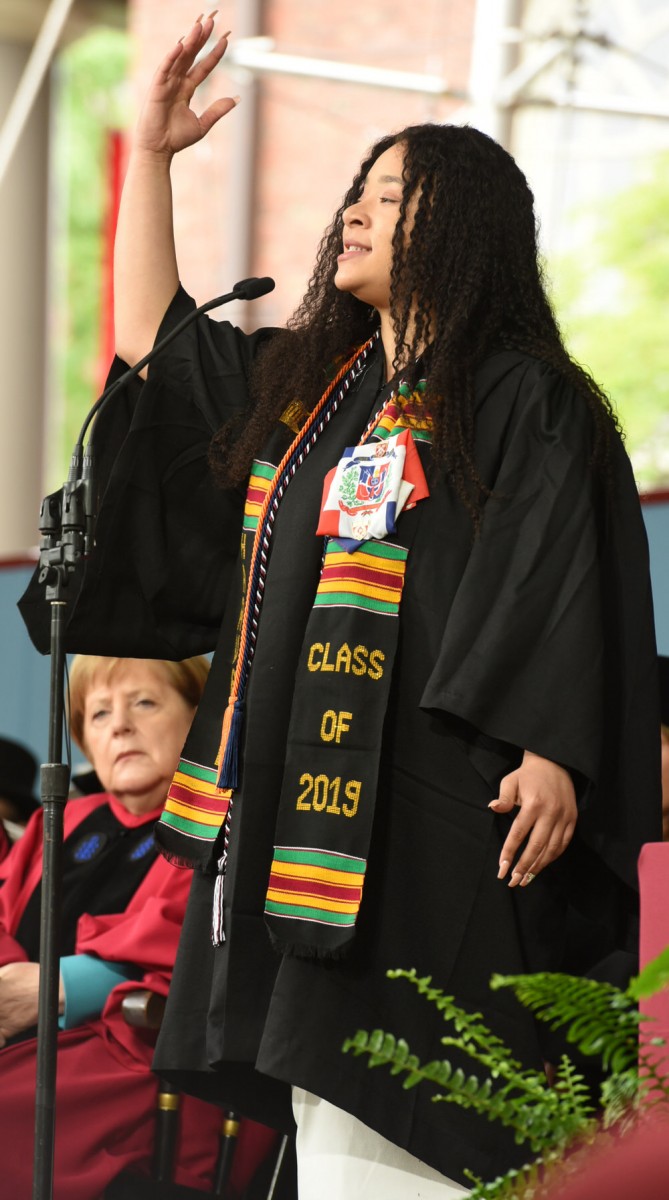
Genesis Noelia De Los Santos Fragoso
Photograph by Jim Harrison
Before her fifth-grade year, De Los Santos was offered a spot in the Steppingstone Academy, a program that prepares underserved students for acceptance and success at top independent, Catholic, and public exam schools in Greater Boston. After the 16-month program, she earned a spot at The Meadowbrook School, an independent school in suburban Weston. Used to being one of 30 kids in a classroom, she had arrived at a school with a student-faculty ratio of 7:1. After succeeding there, she attended the Noble and Greenough School, a private school in Dedham. Had it not been for the Steppingstone Program, she said, she doubts Harvard would have ended up on her radar. Her father, who had lived in the Boston area for more than 30 years, had never visited Harvard Square before his daughter’s move-in day.
At Harvard, De Los Santos, a history and literature concentrator in the ethnic-studies field (and resident of Eliot House), became interested in studying aspects of her identity, specifically her AfroLatinidad and Caribbean origins. Her extracurricular interests connected deeply with her academic ones: she was a co-chair of the Association of Black Harvard Women and president of Black CAST, a black student theater troupe, among other organizations. And she has looked for opportunities to give back to the communities from which she came. Since the summer after her freshman year, she’s worked for the admissions office’s Undergraduate Minority Recruitment Program, arranging on-campus and overnight visits for students who may not have thought of Harvard as a college option. After The Harvard Gazette profiled her, several students found her Instagram account and sent messages about how they didn’t know someone from a background like theirs could attend Harvard. De Los Santos, a fan of mentor relationships, reached out to many of them, answering their questions.
She knew she wanted people to think about how they would use their degrees for good, but said the process of competing for and then polishing her oration made her think more about her own future journey. She, too, had a burden on her shoulders: “What am I going to do with this degree now that I have it? How am I going to continue to impact my community?” She remembered, as a child, joking with her friends about people wearing Harvard hoodies who had no intention of going to any college, let alone Harvard. It was a fashion statement then, but for her, it’s now real. “Now, what will we do with what we have gained here?” her speech concluded. “I hope that as we answer this for ourselves, we lead not with our privilege, but instead work with a desire to create opportunities for others.”
As a recipient of the Trustman Fellowship, De Los Santos will spend next year in Senegal, learning about performance art and diaspora, and thinking about what will come next. Eventually, she sees herself becoming a teacher in Boston. She has never forgotten the teachers who believed in her. Some of them, she said, would be there to see her graduate.
Read her text here.
“The Least You Can Do”: Graduate English Address
When Graduate English Orator Lucila Takjerad, M.P.A. ’19, was seven years old, her home country of Algeria plunged into a bloody civil war. “Every night, I prayed to God that tomorrow, there would not be an empty seat at our dinner table,” she related in her speech.
One day in 1994, her mother noticed some commotion at the local market. The French government was offering some Algerians refuge from the war, and a nonprofit organization was allowing Algerians to sign up for assistance with the emigration process. Her mother, Fadila Takjerad, knew what this opportunity could mean for her family, but couldn’t sign the list: she was illiterate.
A man noticed her walking away and asked for her name. He signed the list for her, and a few months later, the family emigrated. So began a journey in which Takjerad became the first woman in her family to graduate from college and work and live abroad—a road eventually leading to Harvard.
As we are graduating today, I still find myself asking–Why did this wonderful man run after my mother? A simple gesture of writing a stranger’s name on a page offered an entire family hope for a better life. He will probably never know the difference he made, but from the small seeds of his goodness have grown fruits of prosperity for my family, myself, and everyone whom we touch.
Though they had escaped violence in Algeria, the family’s struggles continued in France. They lived for three years in a social shelter, then moved to a housing project in a banlieue (a suburb) just outside Paris. Her father became a mechanic, and her mother cleaned houses. Takjerad learned French at the age of 12 and spent long hours in the library, trying to take advantage of the educational opportunities suddenly available to her—in case she ever had an opportunity to proceed. Despite her stellar grades, her teachers didn’t encourage her to apply for some of the country’s post-secondary preparatory schools, a prerequisite for anyone expecting admission to the prestigious grandes écoles, the country’s best higher-education institutions. “They told me that there’s no melting pot,” Takjerad said in a recent conversation. “That people like me will never be accepted into preparatory school.”
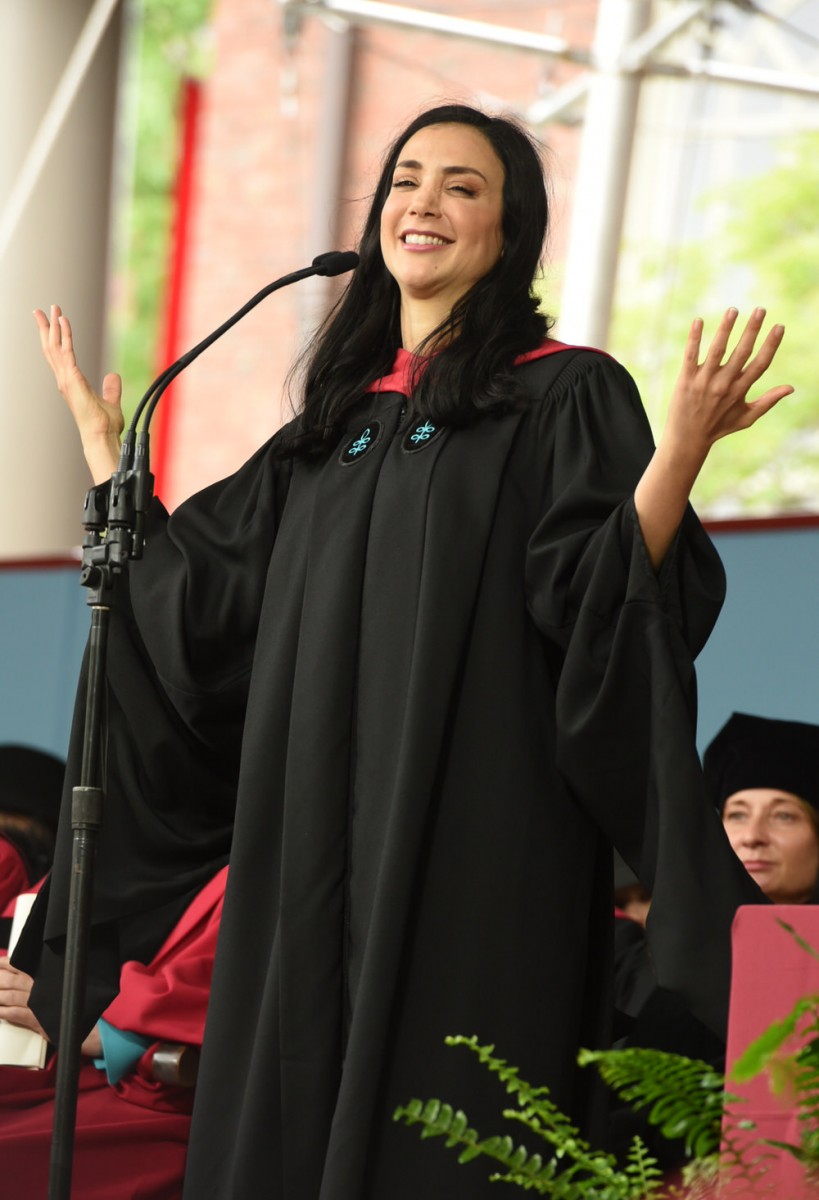
Lucila Takjerad
Photograph by Jim Harrison
Despite these barriers, her superb transcripts secured her a place in preparatory school and, after earning top marks on the national competitive exam, she gained admission to the École des Hautes Etudes Commerciales du Nord, an elite business school. And having gained a top education, she took a pragmatic approach. She asked what the highest-paying jobs would be for the highest-achieving students. “I needed to help my family, I wanted to help my neighbors, I wanted to help my friends,” she said. “So I knew that I couldn’t follow my passion at first and needed to focus on the lucrative side.” She accepted a job in mergers and acquisitions at JP Morgan and spent 10 years working in New York, London, and Abu Dhabi. During that time, she returned to France often, mentoring and tutoring students and supporting many financially. She even encouraged her mother, whom she taught to read and write, to get a high-school diploma of her own.
Takjerad is now ready to give back to her communities—both in France and Algeria—full-time. As a Mason Fellow, part of a Harvard Kennedy School (HKS) program for rising leaders from developing or newly industrialized countries, she hopes to work in public service, either for France or Algeria.
For her, the small things mean just as much, or even more, than the big ones. She’s seen her life permanently changed due to the kindness of a stranger, and she’s seen how her HKS classmates—some of them parents—have been helped out tremendously by classmates who watch their children when they’re busy taking an exam or interviewing for a job. “Fellow graduates, of course do the most you can do: your education and legacy demand it,” she said in the penultimate paragraph of her speech. “But also do the least you can do. Because, the least you can do might turn out to be the most significant.”
Read her text here.
Conferring the Degrees
The musical interlude after the student speakers did their thing was a bit of a departure: e.e. cummings’s sensuous “I Will Wade Out” set to music by Fraser Weist ’18, a computer scientist and musician who got his Harvard degree 103 years after the poet got his. The composition has been heard in the vicinity before: it was performed at the 2018 Baccalaureate service (indoors, of course—within Memorial Church).
There was a smallish cohort of Ph.D.s: 420 this year, down from 573 last year.
Going off script, in an otherwise by-the-books morning, Huntington Lambert, dean of continuing education and University Extension, noted, “I’m very proud of our 40 active military and 87 veterans” graduating, to which President Bacow added, “And so are we,” before conferring their degrees.
Medical School dean George Daley noted the service of retiring, long-serving dental school dean R. Bruce Donoff, as did the provost in calling him forward to present his degree candidates.
After the M.B.A.s got their licenses to practice business, as it were, Business School dean Nitin Nohria asked permission, which he took without waiting a ruling from the chair, to shout out his pride in daughter Ambika Nohria, about to receive her A.B. (In his defense, there would have been a difficult dinner-table conversation had he not done so, having recognized daughter Reva this way in 2017.)
The provost also thanked the Graduate School of Design dean, Mohsen Mostafavi, who concludes his service at the end of June.
About the only student unruliness arose after the undergraduates received their degrees; a lusty cohort chanted “Divest—and reinvest,” a continuing manifestation of student support for purging fossil-fuel and for-profit-prison stocks from the endowment portfolio.
The Honorands
Five men and four women received honorary degrees. Provost Alan M. Garber introduced the honorands in the following order, and President Bacow read the citations. Fuller background on each is available here.
Ingrid Daubechies, Duke professor of mathematics and electrical and computer engineering, Duke University. Doctor of Science. “Following in Fourier’s footsteps,” the pioneering researcher was hailed for her “wizardry at wavelets,” fundamental discoveries underlying the procession, transmission, and storage of images.
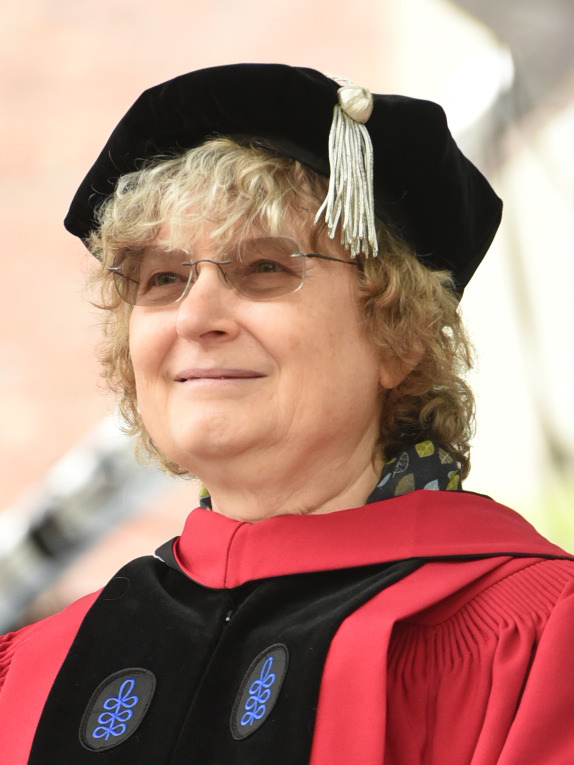
Ingrid Daubechies
Photograph by Jim Harrison
Emmanuel Saez, professor of economics, University of California, Berkeley. Doctor of Laws. A leading researcher on one of society’s deepest problems, this “economist extraordinaire” was hailed as “a scholar of inequality [who] has few equals.”
William Chester Jordan, Dayton-Stockton professor of history, Princeton University. Doctor of Laws. The provost observed that as Harvard honors a preeminent leader of modern Europe, it also honors a preeminent scholar of medieval Europe, who was called “William of orange and black,” a play on his education and affiliation; an historian of a great European famine, his citation praised his “bountiful feast of erudition.”
Dame Marilyn Strathern, Wyse professor of social anthropology emerita, University of Cambridge. Doctor of Laws. The scholar of gender, intellectual property, and reproductive technology was recognized as an “empathic ethnographer.”
Lonnie G. Bunch III, founding director of the National Museum of African American History and Culture, and newly elected secretary of the Smithsonian Institution. Doctor of Laws. The provost noted that he had made the African-American experience central and essential to the American experience. Absent the Faust-era honorand-artist, there was still a bit of pop-up entertainment: singer Davóne Tines ’09—last seen at the American Repertory Theater’s The Black Clown, adapted from the Langston Hughes text—delivered a stirring rendition of “Lift Every Voice and Sing” (the so-called “Black National Anthem”) in tribute, including the haunting lines, “We have come over a way that with tears has been watered,/
We have come, treading our path through the blood of the slaughtered….” His citation called Bunch “fervent in efforts to lift every voice,” and in urging Americans to “face the stony road of the past” (a play on the line from the song, “Stony the road we trod”).
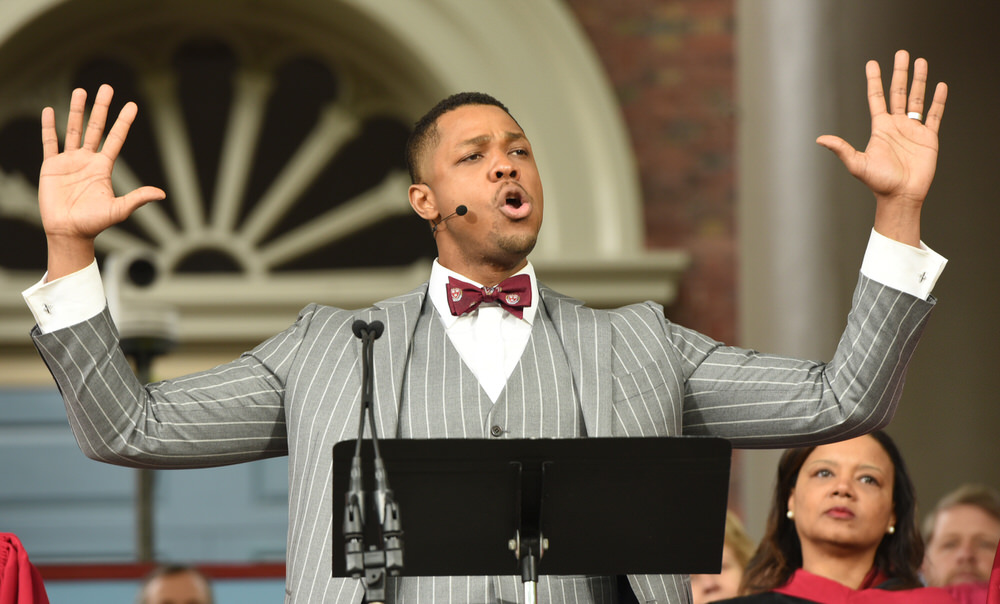
Davóne Tines
Photograph by Jim Harrison
Wu Hung, Ph.D. ’87, Vanderstappen Distinguished Service Professor in art history and East Asian Languages and Civilizations, University of Chicago. Doctor of Arts. A scholar of the entire sweep of Chinese art, in every medium, he was recognized for scholarship ranging “from the caves of Buddhas to the contemporary art scene.”
David Remnick, editor, The New Yorker. Doctor of Laws. The provost noted that the honorand’s deft profiles had included features on past honorands, including Aretha Franklin, Al Gore, Elaine Pagels, Vaclav Havel, and others. His citation called him “prolific in profiling politicians and pugilists,” a journalist who is “intent and indefatigable in pursuit of truth.”
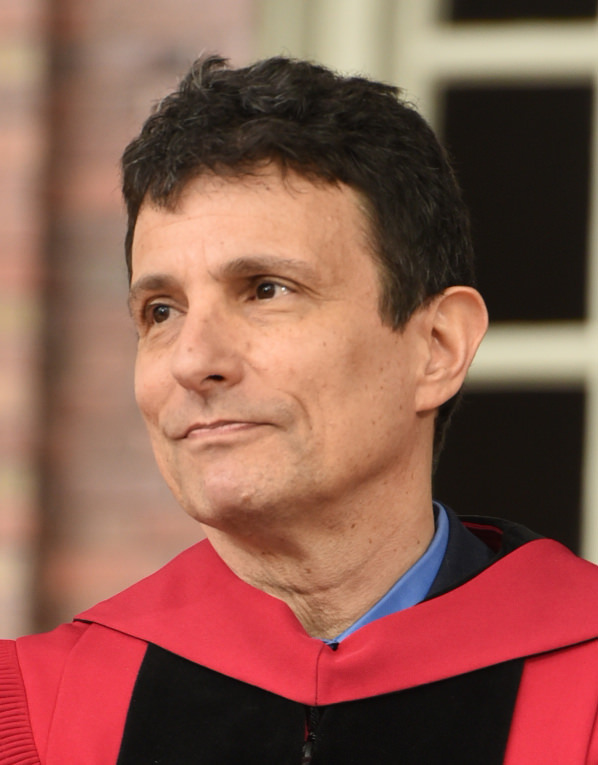
David Remnick
Photograph by Jim Harrison
Drew Gilpin Faust, Harvard president emerita. Doctor of Laws. Riffing on her “parking space theory of life” (see Baccalaureate coverage, above), the provost said Harvardians were ever glad that she “chose to park her car in Harvard Yard.” Referring to the title of her most acclaimed book of Civil War history, her citation called her “a luminous leader of this republic of learning,” and in a bow to her theme of One Harvard, noted that “out of many Harvards, she drew one.”
Angela Merkel, chancellor, Federal Republic of Germany. Doctor of Laws. The provost noted that after the fall of the Berlin Wall, the chemist turned in a new direction, toward what became her life’s work, “the pursuit and practice of democratic governance,” prompting the first of several ovations. She was cited as a “quantum chemist turned stalwarts statesperson,” in whose times “a wall came down and she rose up, leading her nation with strenth and savvy,” and leading Europe through challenge and change. Delighted, the chancellor clasped her hands and bowed her head, and took a sneak peak at her honorary degree.
Finis
Thereafter, the morning wrapped up swiftly, with the provost inviting all to attend the afternoon speeches, beginning at 2:30 p.m., and the Reverend Jonathan L. Walton, Pusey Minister in Memorial Church, making his last benediction before departing for a deanship at Wake Forest, asking the Lord to “free us” from fear and timidity and “fill us” with love and sympathy—and, again playing on Faust’s title, “Once you free us and once you fill us, Lord, we would ask you to use us to heal the many republics of suffering across the globe.”
The sheriff deafened everyone again, the bells rang at 11:45 a.m. (elapsed time, 1:58), and students were released, after the platform party disembarked, to go get their degrees for real.
